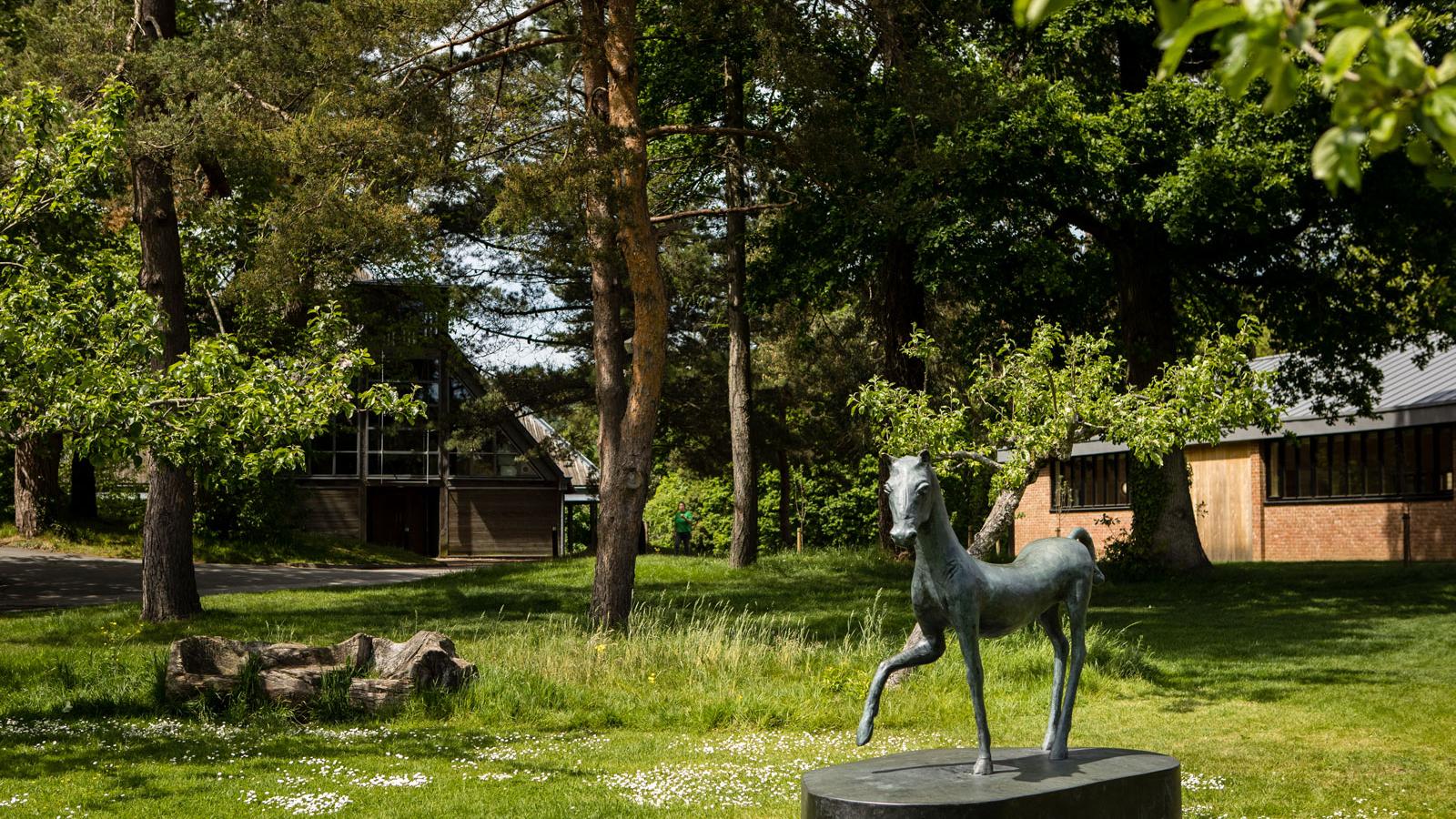
Sir Jonathan Taylor, as he has been since 2019, is a contemporary British figure in the world of international financial services. In this profile, Jonathan looks back on his decade at Bedales with affection, singling out for particular praise the teaching he received from some of the school’s most revered figures. The influence of people such as Ruth Whiting (staff, 1963-2000) and John Batstone (staff, 1968-93) remains fresh in his mind: “They had extremely high standards and expected from you the best of which you were capable.” It is a maxim to which he has consistently adhered in his own professional life ever since.
As is still the way of the world for children from a family in the diplomatic service, Jonathan Taylor’s introduction to boarding school was a matter of logistical necessity. “My father was in the Foreign Office and it was only a matter of time before I was sent down the boarding route,” Jonathan reflects. “I’d previously been to a series of local schools in London and Paris, Dunhurst was the choice for a few reasons. My mother was an Australian with an independent cast of mind and my father had been to a traditional boys’ public school at Cheltenham and not been over-enamoured of the experience. My parents also had a number of friends who had been at Bedales and spoke warmly of it and that probably sealed the decision.”
Although he was just eight when he began as a Dunhurst boarder, Jonathan remembers adapting to his new environment relatively speedily. “I didn’t mind the prospect of leaving home, disliked the reality only on the day I arrived, as far as I can recall, and recovered my spirits quickly enough”, he says. “There were five of us in a dormitory, all new, and one of them was another son of a Foreign Office father, which helped to break the ice."
I don’t have the clearest memories of those early days in Steep; but I remember the lawn at the front of school and the Orchard with a broken-down Jeep in it.
Jonathan’s recollections come into sharper focus a little later on in his Bedales experience. “A lot of my early school life was spent in the barn, the art room or the workshop,” he says. “I found that I had no natural capacity for crafts, although I was OK at painting and drawing. Sport was fun and I enjoyed cricket and football, as I do to the present day. As I grew older, I got involved in a bit of music as well, although my involvement was confined to singing in the choir. It was Drama that particularly appealed; I did quite a lot from Block 2 onwards and was at one point even thinking of having a go at it professionally before waking up to the fact that I wasn’t good enough.”
In the Drama arena, one or two mentors made a particular mark. “Rachel Carey-Field (staff, 1941-75) was certainly a great influence”, he says. “She could be a formidable, hard task-master but I learned a great deal from her. The English department also had a lot to do with Drama – John Batstone and Tim Williams (staff, 1984-88), of course, but also David Thompson (staff, 1971-75), with whom I’m still in touch, who later went off to become a successful director on a rather wider stage.”
In the classroom, there was also a wide variety of outstanding teaching for Jonathan to admire and learn from. “The Bedales approach to academia tended to mean that if you were prepared to take advantage of the riches on offer, you were exceptionally well placed for the future”, he observes. “Long-serving and high-profile teachers such as John Batstone and Ruth Whiting would not spoon-feed their students; they expected learning to be prized on its own account and that people would make the necessary effort to read around their subject."
If you thrived on the independence and being drawn into a free-thinking universe, it was a brilliant environment. But that wasn’t, and still isn’t, for everybody.
“There was a certain level of competitiveness among and between Bedales students but often in attempting to achieve the best possible result while giving the impression of having done the bare minimum of work” Jonathan adds. “Ruth and John had no time for any of that. They had extremely high standards and expected from you the best of which you were capable.”
As the end of his Bedales sojourn neared, Jonathan had no fixed ideas of what his life beyond university might look like. “I was generally a Humanities person, having done English, History and Economics at A Level, and the idea of reading PPE at Oxford sounded interesting”, he relates. “Beyond that, though, I had no particular career aspirations, although I did know what I didn’t want to do. The Foreign Office, for example, was something I decided against because I was well aware of the disruption it could bring if you had any ambitions of a settled family life although, ironically, I was later twice seconded to the Foreign Office during my career in Government.”
It had been an enjoyable decade of school, but Jonathan was ready to move on. “The late 60s and early 1970s was a very exciting time to have grown up but every young person thinks that of their era”, he muses. “Not everyone would agree with my feeling that the 70s was a fabulous decade but it certainly was if you were aged somewhere between 15 and 25 at the time. When the time came for me to leave Bedales, I was very much looking forward to university, if with some apprehension at saying goodbye to friends. As it happens, 50 and 60 years later, there quite a few to whom I remain extremely close.”
University, when it arrived, proved to be very much to Jonathan’s taste. “I loved Oxford and had a fantastic time there. My circle of friends consisted largely of Londoners most of whom, I’m fairly sure, would have fitted in perfectly at Bedales.”
In 1977 Jonathan took his first steps on a ladder that would ultimately lead to one of the more successful, and certainly varied, careers of his generation. “That was when I first joined the Treasury and I remained on their books for the best part of the next 25 years, which also encompassed two secondments to the Foreign Office in Brussels”, he explains. “I then left to work in the City of London.”
Jonathan’s spell in the City took him to UBS as a Managing Director and to a role as Director General of the London Investment Banking Association before he was lured back to the Treasury to serve as Director General of Financial Services. Arguably the crowning glory of his career was still to come – the invitation in 2012 to serve as a Vice-President of the European Investment Bank, a position he would hold for six years.
“Most people’s careers tend to be shaped by a great deal of chance”, Jonathan suggests. “One thing leads to another and you acquire a range of skills – squaring the circle of the political world, for example – that enable other possibilities at the same time as you’re specialising in something different."
The thread that has bound my professional life together has been financial services in an international context; I suppose the EIB was the summit for me and the rest of my career rather led up to that.
In 2019, Jonathan was knighted for services to investment and the economy and he still retains more than a toehold in the commercial world as a non-executive director at the Scottish National Investment Bank and a senior advisor with Afore Consulting. He has also put his intellect to good use in slightly more recondite areas and was recently a member of the winning team in the popular BBC television quiz show Only Connect.
“I was so lucky with my education at Bedales, which encouraged me to think more widely about the world and allowed me to assemble the intellectual equipment to handle whatever was thrown at me in later life”, Jonathan ruminates. “It was a place for people with motivation – the door was never locked to anyone but you had to open it for yourself. I still greatly value my connection with the school, most recently at our 50th anniversary reunion last year. The weather was so vile we couldn’t wander outside at all. Still, there was a tour of the Library, the Lupton Hall and all those wonderful new buildings in which the school has invested so heavily, all conducted by some splendid Sixth Formers. The underlying ethos seems remarkably unchanged since my day. That’s very good news – we had a great time at Bedales and I suspect our successors do too.”
Jonathan Taylor was interviewed by James Fairweather in Autumn 2023
